2018英语翻译知识点复习考点归纳总结
2018年高考英语真题全国一卷阅读理解部分:全文英汉对照翻译+解析+重点词汇
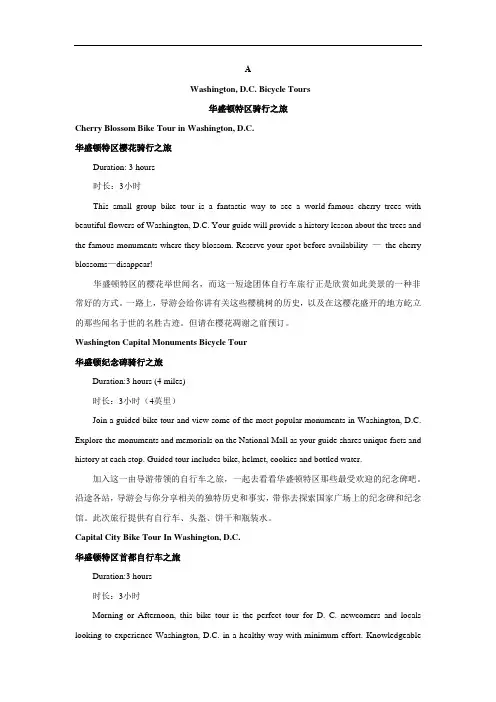
AWashington, D.C. Bicycle Tours华盛顿特区骑行之旅Cherry Blossom Bike Tour in Washington, D.C.华盛顿特区樱花骑行之旅Duration: 3 hours时长:3小时This small group bike tour is a fantastic way to see a world-famous cherry trees with beautiful flowers of Washington, D.C. Your guide will provide a history lesson about the trees and the famous monuments where they blossom. Reserve your spot before availability —the cherry blossoms—disappear!华盛顿特区的樱花举世闻名,而这一短途团体自行车旅行正是欣赏如此美景的一种非常好的方式。
一路上,导游会给你讲有关这些樱桃树的历史,以及在这樱花盛开的地方屹立的那些闻名于世的名胜古迹。
但请在樱花凋谢之前预订。
Washington Capital Monuments Bicycle Tour华盛顿纪念碑骑行之旅Duration:3 hours (4 miles)时长:3小时(4英里)Join a guided bike tour and view some of the most popular monuments in Washington, D.C. Explore the monuments and memorials on the National Mall as your guide shares unique facts and history at each stop. Guided tour includes bike, helmet, cookies and bottled water.加入这一由导游带领的自行车之旅,一起去看看华盛顿特区那些最受欢迎的纪念碑吧。
2018年英语一翻译详解
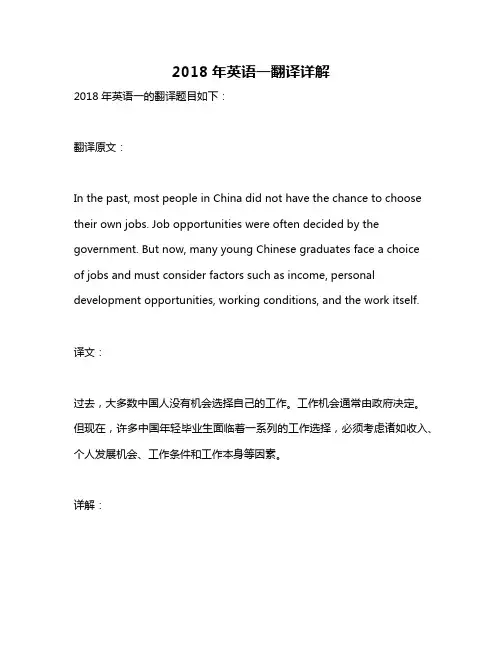
2018年英语一翻译详解2018年英语一的翻译题目如下:翻译原文:In the past, most people in China did not have the chance to choose their own jobs. Job opportunities were often decided by the government. But now, many young Chinese graduates face a choiceof jobs and must consider factors such as income, personal development opportunities, working conditions, and the work itself.译文:过去,大多数中国人没有机会选择自己的工作。
工作机会通常由政府决定。
但现在,许多中国年轻毕业生面临着一系列的工作选择,必须考虑诸如收入、个人发展机会、工作条件和工作本身等因素。
详解:1. “most people in China did not have the chance to ch oose their own jobs”的译文由“大多数中国人没有机会选择自己的工作”调整为“大多数中国人没有机会选择自己的职业”,更符合中文表达习惯。
2. “Job opportunities were often decided by the government”的译文由“工作机会通常由政府决定”调整为“工作机会通常由政府分配”,更符合原文意思。
3. “face a choice of jobs”的译文由“面临着一系列的工作选择”调整为“面临着一系列的工作岗位选择”,更符合中文表达习惯。
4. “factors such as income, personal development opportunities, working conditions, and the work itself”的译文由“诸如收入、个人发展机会、工作条件和工作本身等因素”调整为“诸如收入、个人发展机会、工作条件等条件和工作本身”,更符合中文表达习惯。
英文翻译知识点总结
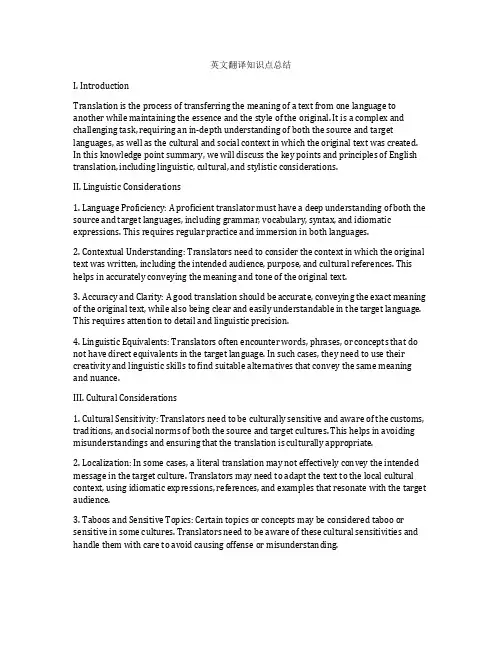
英文翻译知识点总结I. IntroductionTranslation is the process of transferring the meaning of a text from one language to another while maintaining the essence and the style of the original. It is a complex and challenging task, requiring an in-depth understanding of both the source and target languages, as well as the cultural and social context in which the original text was created. In this knowledge point summary, we will discuss the key points and principles of English translation, including linguistic, cultural, and stylistic considerations.II. Linguistic Considerations1. Language Proficiency: A proficient translator must have a deep understanding of both the source and target languages, including grammar, vocabulary, syntax, and idiomatic expressions. This requires regular practice and immersion in both languages.2. Contextual Understanding: Translators need to consider the context in which the original text was written, including the intended audience, purpose, and cultural references. This helps in accurately conveying the meaning and tone of the original text.3. Accuracy and Clarity: A good translation should be accurate, conveying the exact meaning of the original text, while also being clear and easily understandable in the target language. This requires attention to detail and linguistic precision.4. Linguistic Equivalents: Translators often encounter words, phrases, or concepts that do not have direct equivalents in the target language. In such cases, they need to use their creativity and linguistic skills to find suitable alternatives that convey the same meaning and nuance.III. Cultural Considerations1. Cultural Sensitivity: Translators need to be culturally sensitive and aware of the customs, traditions, and social norms of both the source and target cultures. This helps in avoiding misunderstandings and ensuring that the translation is culturally appropriate.2. Localization: In some cases, a literal translation may not effectively convey the intended message in the target culture. Translators may need to adapt the text to the local cultural context, using idiomatic expressions, references, and examples that resonate with the target audience.3. Taboos and Sensitive Topics: Certain topics or concepts may be considered taboo or sensitive in some cultures. Translators need to be aware of these cultural sensitivities and handle them with care to avoid causing offense or misunderstanding.4. Historical and Political Context: Historical and political references in the original text may not be readily understood in the target culture. Translators need to provide explanations or contextual information to help the reader grasp the significance of these references.IV. Stylistic Considerations1. Register and Tone: Translators need to match the register and tone of the original text in the target language, whether it is formal, informal, technical, or literary. This ensures that the translation reflects the style and voice of the original author.2. Cohesion and Coherence: A good translation maintains the cohesion and coherence of the original text, ensuring that the ideas flow logically and smoothly in the target language. This requires careful attention to transitions, pronoun references, and sentence structure.3. Rhythm and Style: In literary translations, the rhythm and style of the original work need to be preserved to the extent possible. This may involve creative choices in the use of language and imagery that capture the essence of the original.4. Idiomatic Expressions: Translators need to be adept at handling idiomatic expressions, proverbs, and wordplay, finding creative ways to convey the same meaning and impact in the target language.V. Practical Considerations1. Translation Tools: Translators often use computer-assisted translation tools, such as CAT software, dictionaries, and glossaries, to aid in the translation process. These tools can help maintain consistency and accuracy across large or complex projects.2. Proofreading and Editing: A thorough proofreading and editing process is essential to ensure the quality and accuracy of the translation. This may involve multiple revisions and feedback from other language experts.3. Specialized Knowledge: Translating technical, medical, legal, or scientific texts may require specialized knowledge and terminology in the relevant fields. Translators need to familiarize themselves with the specific language and conventions of these domains.4. Client and Audience Expectations: Translators need to understand the needs and expectations of their clients or target audience, whether it is for marketing, education, entertainment, or information. Adapting the translation to meet these expectations is crucial.VI. ConclusionIn conclusion, English translation is a multifaceted process that requires a deep understanding of linguistic, cultural, and stylistic considerations. It demands a high level of language proficiency, cultural sensitivity, and creativity to produce accurate and effectivetranslations. By mastering these key points and principles, translators can bring the richness and diversity of the world's languages and cultures to a global audience.。
2018最新版高中英语知识点归纳总结整理版本
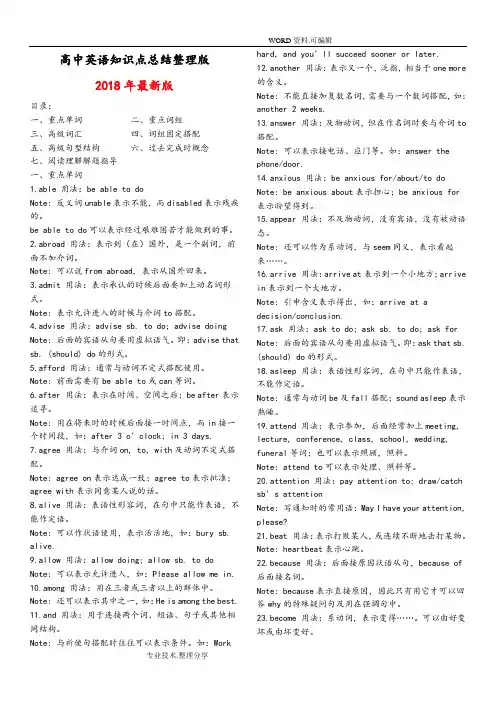
高中英语知识点总结整理版2018年最新版目录:一、重点单词二、重点词组三、高级词汇四、词组固定搭配五、高级句型结构六、过去完成时概念七、阅读理解解题指导一、重点单词1.able 用法:be able to doNote: 反义词unable表示不能,而disabled表示残疾的。
be able to do可以表示经过艰难困苦才能做到的事。
2.abroad 用法:表示到(在)国外,是一个副词,前面不加介词。
Note: 可以说from abroad, 表示从国外回来。
3.admit 用法:表示承认的时候后面要加上动名词形式。
Note: 表示允许进入的时候与介词to搭配。
4.advise 用法:advise sb. to do; advise doing Note: 后面的宾语从句要用虚拟语气。
即:advise that sb. (should) do的形式。
5.afford 用法:通常与动词不定式搭配使用。
Note: 前面需要有be able to或can等词。
6.after 用法:表示在时间、空间之后;be after表示追寻。
Note: 用在将来时的时候后面接一时间点,而in接一个时间段,如:after 3 o’clock; in 3 days.7.agree 用法:与介词on, to, with及动词不定式搭配。
Note: agree on表示达成一致;agree to表示批准;agree with表示同意某人说的话。
8.alive 用法:表语性形容词,在句中只能作表语,不能作定语。
Note: 可以作状语使用,表示活活地,如:bury sb. alive.9.allow 用法:allow doing; allow sb. to do Note: 可以表示允许进入,如:Please allow me in.10.among 用法:用在三者或三者以上的群体中。
Note: 还可以表示其中之一,如:He is among the best.11.and 用法:用于连接两个词、短语、句子或其他相同结构。
2018届英语翻译(词汇)
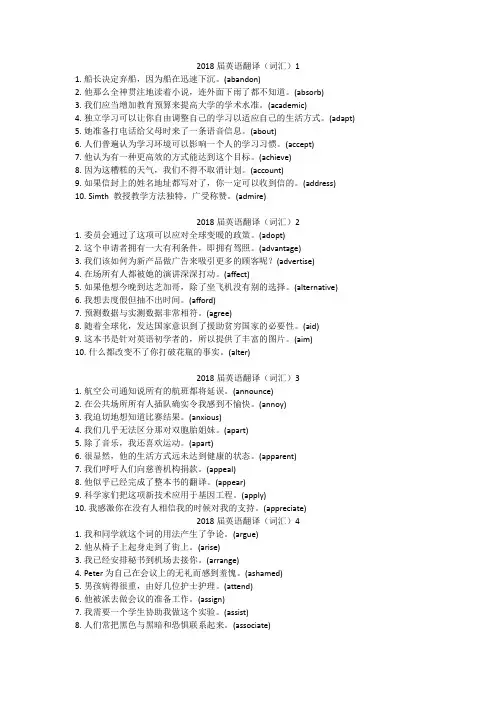
2018届英语翻译(词汇)11.船长决定弃船,因为船在迅速下沉。
(abandon)2.他那么全神贯注地读着小说,连外面下雨了都不知道。
(absorb)3.我们应当增加教育预算来提高大学的学术水准。
(academic)4.独立学习可以让你自由调整自己的学习以适应自己的生活方式。
(adapt)5.她准备打电话给父母时来了一条语音信息。
(about)6.人们普遍认为学习环境可以影响一个人的学习习惯。
(accept)7.他认为有一种更高效的方式能达到这个目标。
(achieve)8.因为这糟糕的天气,我们不得不取消计划。
(account)9.如果信封上的姓名地址都写对了,你一定可以收到信的。
(address)10.Simth 教授教学方法独特,广受称赞。
(admire)2018届英语翻译(词汇)21.委员会通过了这项可以应对全球变暖的政策。
(adopt)2.这个申请者拥有一大有利条件,即拥有驾照。
(advantage)3.我们该如何为新产品做广告来吸引更多的顾客呢?(advertise)4.在场所有人都被她的演讲深深打动。
(affect)5.如果他想今晚到达芝加哥,除了坐飞机没有别的选择。
(alternative)6.我想去度假但抽不出时间。
(afford)7.预测数据与实测数据非常相符。
(agree)8.随着全球化,发达国家意识到了援助贫穷国家的必要性。
(aid)9.这本书是针对英语初学者的,所以提供了丰富的图片。
(aim)10.什么都改变不了你打破花瓶的事实。
(alter)2018届英语翻译(词汇)31.航空公司通知说所有的航班都将延误。
(announce)2.在公共场所所有人插队确实令我感到不愉快。
(annoy)3.我迫切地想知道比赛结果。
(anxious)4.我们几乎无法区分那对双胞胎姐妹。
(apart)5.除了音乐,我还喜欢运动。
(apart)6.很显然,他的生活方式远未达到健康的状态。
(apparent)7.我们呼吁人们向慈善机构捐款。
2018考研英语翻译语法讲解:定语从句(3)融合法_毙考题
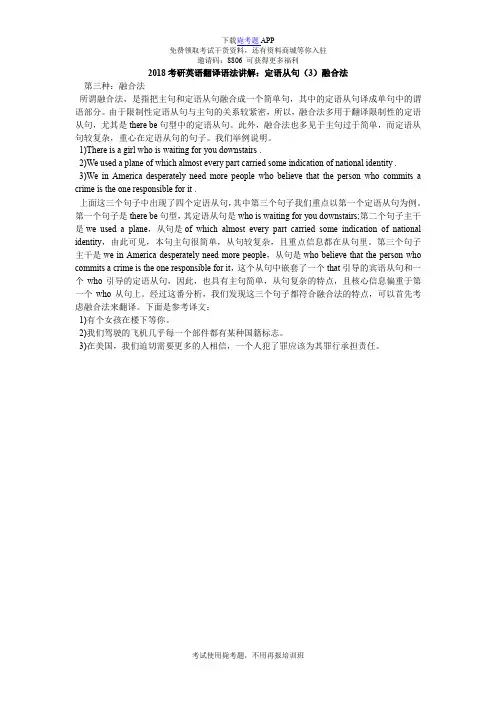
下载毙考题APP免费领取考试干货资料,还有资料商城等你入驻邀请码:8806 可获得更多福利2018考研英语翻译语法讲解:定语从句(3)融合法第三种:融合法所谓融合法,是指把主句和定语从句融合成一个简单句,其中的定语从句译成单句中的谓语部分。
由于限制性定语从句与主句的关系较紧密,所以,融合法多用于翻译限制性的定语从句,尤其是there be句型中的定语从句。
此外,融合法也多见于主句过于简单,而定语从句较复杂,重心在定语从句的句子。
我们举例说明。
1)There is a girl who is waiting for you downstairs .2)We used a plane of which almost every part carried some indication of national identity .3)We in America desperately need more people who believe that the person who commits a crime is the one responsible for it .上面这三个句子中出现了四个定语从句,其中第三个句子我们重点以第一个定语从句为例。
第一个句子是there be句型,其定语从句是who is waiting for you downstairs;第二个句子主干是we used a plane,从句是of which almost every part carried some indication of national identity,由此可见,本句主句很简单,从句较复杂,且重点信息都在从句里。
第三个句子主干是we in America desperately need more people,从句是who believe that the person who commits a crime is the one responsible for it,这个从句中嵌套了一个that引导的宾语从句和一个who引导的定语从句,因此,也具有主句简单,从句复杂的特点,且核心信息偏重于第一个who从句上。
2018年考研翻译硕士英语翻译重点解析
2018年考研翻译硕士英语翻译重点解析宾语从句翻译法由that, what, how, where等词引导的宾语从句一般按照原文顺序翻译,即顺译法。
Eg:Scientists have reason to think that a man can put up with far more radiation than 0.1 rem without being damaged.科学家们有理由认为人可以忍受远超过0.1雷姆的辐射而不受伤害。
\Eg:We wish to inform you that we specialize in the export of Chinese textiles and shall be glad to enter into business relations with you on the basis of equality and mutual benefit.我公司专门办理中国纺织品出口业务,并愿在平等互利的基础上同贵公司建立业务关系。
状语从句翻译法1)顺译法:按照原文顺序翻译。
Eg:If the negotiations between the rich nations and the poor nations make headway, it is intended that a ministerial session in December should be arranged.如果富国和穷国之间的谈判获得进展的话,就打算在12月份安排召开部长级会议。
2)逆译法:把位于句末的从句放在句首。
Eg:Obviously, there would be no point in investing in a computer if you had to check all its answers, but people should also rely on their own internal computers and check the machine when they have the feeling that something has gone wrong.显然,如果计算机给出的全部答案均需要核查,花钱买计算机就毫无意义。
2018年考研英语分词翻译方法总结
2018年考研英语分词翻译方法总结现在分词和过去分词是考研中的重要考点之一,在翻译中出现的频率也很高,现在分词和过去分词主要差别在于:现在分词表示“主动和进行”,过去分词表示“被动和完成”(不及物动词的过去分词不表示被动,只表示完成)。
分词可以有自己的状语、宾语或逻辑主语等。
分词在句子中可做状语也可做定语。
1.分词作状语,可以表示时间、条件、原因、结果(补充说明)、让步、伴随等。
分词做状语时,它的逻辑主语与句子的主语一致。
作状语的分词相当于一个状语从句。
分词在句子中作状语,使用何种分词,要取决于分词与句子主语的关系:主谓关系用现在分词,动宾或被动关系用过去分词。
2.分词作定语,做定语的单个的分词通常放在被修饰的名词之前,分词短语一般置于所修饰的中心词后面。
现在分词修饰的是发出该动作的名词(与名词有主谓关系),过去分词修饰承受该动作的名词(与名词是动宾关系)。
在翻译时,需首先判断分词在句子中所承担的成分,然后参照定语从句和状语从句的相关翻译技巧来翻译即可。
【真题例句1】Being interested in the relationship of language and thought, Whorf developed the idea that the structure of language determines the structure of habitual thought in a society.【解析】Being interested in…现在分词结构作状语,表原因。
本句是一个主从复合句。
句子的主干为“Whorf developed the idea”,Being interested in…现在分词结构作状语,表原因。
That引导同位语从句进一步解释说明idea。
【参考译文】沃尔夫对语言与思维的关系很感兴趣,因此逐渐形成了这样的观点:在一个社会中,语言的结构决定习惯性思维的结构。
翻译考点归类
翻译考点归类一、词汇翻译词汇翻译是翻译考试中的常见考点之一。
在理解文本的基础上,准确地翻译词汇是确保翻译质量的关键。
1. 同义词翻译同义词翻译要求我们准确把握原词的含义,并寻找与之相对应的目标语言词汇。
例如,在英汉翻译中,"happy"可以翻译成"快乐"、"高兴"等,在具体情境中选择适当的译词非常重要。
2. 词性转换有时候,原文中的一个名词需要翻译成一个动词,或者一个形容词需要翻译成一个副词。
在这种情况下,我们需要将词性进行转换。
例如,"knowledge"是一个名词,在翻译时可以转换成动词"了解"。
3. 习惯用语翻译习惯用语在不同语言中可能有不同的表达方式。
我们需要了解各个语言的习惯用语,并将其准确地翻译出来。
例如,在英语中,"break a leg"意为"祝好运",在翻译时需要采用类似的表达方式。
二、句子翻译除了词汇翻译外,句子的翻译也是翻译考试中的重要内容。
准确地传达原文句子的含义,同时确保语言通顺,是句子翻译的核心要求。
1. 逐句翻译逐句翻译要求我们将原文中的每一个句子都准确地翻译成目标语言。
在翻译过程中,要注意语法结构和语言习惯的差异,避免产生歧义或翻译错误。
2. 句型转换在某些情况下,原文使用了一种句型,而在目标语言中,我们需要使用另一种句型来准确传达原文的意思。
在这种情况下,我们需要将句子进行句型转换。
例如,原文中使用的是被动语态,而目标语言要求使用主动语态。
三、篇章翻译除了词汇和句子翻译外,篇章翻译也是翻译考试中需要注意的内容。
篇章翻译要求我们将整篇文章的意思准确地传达出来,并且保持原文的逻辑和条理。
1. 段落结构每个段落都应该具备明确的主题,并且与上下文有机地衔接。
当翻译文章时,我们需要注意段落结构的合理性,并在语言上保持一致。
2. 衔接词的运用在篇章翻译中,适当使用衔接词可以使文章的逻辑更加清晰。
【考研真相】2018考研英语(一)—被你忽视的翻译得分要点
【考研真相】2018考研英语(一)—被你忽视的翻译得分要点
阅读和写作是考研英语一中的得分大头,也是很多正在准备考研的小伙伴们复习的重点所在,像翻译这种分值少、得分率低的题型就自然受到大家的“冷落”。
可是,“一分也是爱”,下面太阳城考研1号的小编就跟大家好好说道说道考研英语一翻译的复习方法。
一、考研英语一翻译复习步骤
1.在不借助任何词典的情况下根据自己的理解翻译一遍。
2.理清翻译难点,逐层拆译,查出生词,分析句子结构和语法类型。
3.层层整合,将各个句型和结构进行逻辑整合,使译文摆脱翻译痕迹。
4.对照参考译文,找出自己的译文与标准答案的区别,并弄清楚为何译文要这样翻译,这样翻译有什么优点,而自己的译文差在哪里,以后要如何注意。
例如:
(图片源自《考研真相》2014年考研英语(一)翻译)
二、考研英语一翻译注意事项
1.不可急躁,一定要先通读全文,把握全文的主旨、内容,把握划线部分的语境。
2.在着重理解划线部分时,首先要在语义上理清全句的整体意思和每个单词的意思;其次要分析清楚句子结构,理出句群,找出各分句之间的关系。
3.可考虑先打一份翻译草稿,再根据文章意思和汉语结构进行调整。
其实,只要大家掌握了科学的复习考研英语一翻译的方法,大家在翻译上也能拿到一个很可观的分数。
历届很多同学都是因为考研英
语一不过线含恨败北,所以大家要对翻译也有足够的重视。
特别是基础较差的同学,更应该努力掌握各个题型基本的做题方法。
基础薄弱不用愁,《考研真相》会解你忧!逐词逐句解真题,英语逆袭得高分!。
- 1、下载文档前请自行甄别文档内容的完整性,平台不提供额外的编辑、内容补充、找答案等附加服务。
- 2、"仅部分预览"的文档,不可在线预览部分如存在完整性等问题,可反馈申请退款(可完整预览的文档不适用该条件!)。
- 3、如文档侵犯您的权益,请联系客服反馈,我们会尽快为您处理(人工客服工作时间:9:00-18:30)。
1.Sandy is wearing a long, black, silk dress.桑迪穿了条黑色的长丝裙。
43. I came to London when I was 18.
我18岁的时候来到伦敦。
44. It takes 45 minutes to get to the city centre from the hotel.
宾馆到市中心需要花45分钟时间。
One of the biggest sporting events in the world is the Olympic Games. 奥运会是世界上规模最大的体育比赛之一
41. While she was waiting, her phone rang.她正在等待的时候,电话铃响了
42. Although it is very enjoyable, the film is too long.虽然这部电影非常令人愉快,但是太长了。
43. We have enough money to improve the website.我们有足够的钱改进网站。
44. 1 had the windows cleaned yesterday.昨天我请人把窗户给擦了。
45. He came across an old violin at his friend's house.他在朋友家偶然发现了一把旧提琴。
41.She borrowed the book and gave it back on Monday.
她借了那本书,后来星期一把书还了。
45.He used tO play basketball every Sunday.他以前每个周日都打篮球。
41.Football is played by more than 20 million people in more than l40 countries·
超过140个国家的2000多万人都踢足球。
42.I’ve got the same sense of humour as my mum·我和我妈妈一样,有幽默感
43.He got on well with his classmates.
他和同学关系处得很好
44.He used tO work very hard when he was youn9.
他年轻的时候工作非常努力。
45.My family is putting me up at the moment,but I am thinking of buying my own flat.我现在跟家人住在一起,但是我正考虑买一套公寓自己住
41.He got on well with his sister.
他和他的姐/妹相处得很好
44.That box is too heavy for her to carry home.那个盒子太重了,她抬回家。
41. Although it is very enjoyable, the film is too long.虽然这部电影
非常令人愉快,但是太长了。
43. I need to be at the airport by 6.00 o’clock.我得在六点前到达机场。
44. I must have left the camera in a shop.我一定是把相机丢在那家商
店里了。
31. We have enough money to improve the website.
我们有足够的钱改进网站。
45. The accounts, which are in a bit of a mess, have to be ready for next month.
帐目现在有点乱,必须要在下个月清理好。
32. Do you take after your mother or father?你像你的母亲或父亲吗?
35. I’ve been learning English for three years.
我已经学英语3年了33. I have to move out of my room on Friday because Franco has got another tenant.
我周五得从房子里搬出来,因为佛朗哥又招了一位房客。
35.would be great to see you to catch up on all our news.
到时见了面咱们把这些日子发生的事聊一聊,会多开心啊。
:33. They enjoyed themselves at the party.
他们在聚会上玩的很愉快
34.She doesn’t like swimming and neither does her sist er.
她不喜欢游泳,她妹妹也不喜欢
32. He used to play basketball every Sunday(
每个星期天他常常去打篮球
31. He studies in a university west of Beijing.
他在北京西部的一个大学学习
:32. He came across an old painting at his friend’s house.
他在他朋友家看到了一幅旧画
33. She would buy a large house if she won the lottery.
如果她中了彩票,她就买一幢大房子
:35. Both of the boys are good at singing.
这两个男孩都擅长唱歌
34. The flat was in a bit of mess.
公寓里一片狼籍
43. We've become good friends since last summer. 从去年夏天起我们就成了好朋友了。
44. Your neighbour says your flat was burgled this afternoon.
.休的邻居说你的房子今天下午被盗了。
45. I haven't got a car, and nowhere to live. My family is putting me up at the mom
我没有车,也没有地方住。
现在跟家人住一起。
44. Although it is very enjoyable, the film is too long. 虽然这部电影非常令人愉快,但是太长了。
1.I can’t find the key.I must have left it in the car.
我找不到钥匙了,我肯定将它丢在车上了。
2.Polly is worried about her lack of experience.
波利担心自己缺乏经验。
3.she needs to return the book by next Friday
她得在下周五之前把书还回去。
43. We've become good friends since last summer. 从去年夏天起我们就成了好朋友了。
42. Polly(波莉) is worried about her lack of experience.
波莉担心自己缺乏经验。
43. She needs to return the hook by next Friday.
她得在下周五之前把书还回去。
41. He got on well with his sister.
他和他的姐姐(妹妹)相处得很好。
42. He pointed out that she needed a better violin.
他指出她需要一把更好点儿的提琴。
43. They walked slowly along the road.
他们沿着那条路慢慢地走着。
44. She borrowed the book and gave it back on Monday. 她借了那本书,后来星期一把书还了。
45. I'm in a meeting until 1. 00.
我开会开到一点钟。
When I finish traveling, I am going to get a jop in a bank. 当我旅行后,我将会在银行里面得到一份工作。
